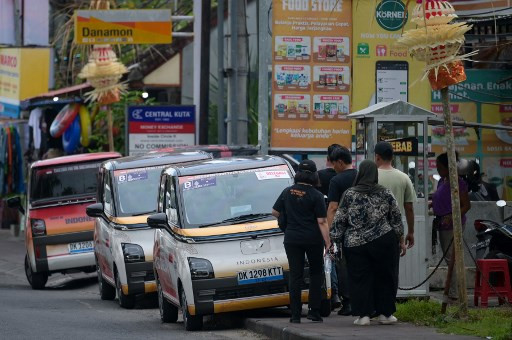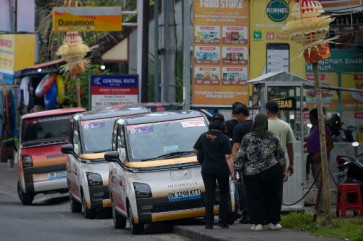Popular Reads
Top Results
Can't find what you're looking for?
View all search resultsPopular Reads
Top Results
Can't find what you're looking for?
View all search resultsAre subsidies for private electric vehicles effective?
Subsidy policies that encourage EV use need to be integrated with policies to encourage the use of public transportation and non-motorized transportation, such as walking and cycling.
Change text size
Gift Premium Articles
to Anyone
 People walk past parked G20 Summit official electric vehicles (EVs) in Nusa Dua, Bali on Nov. 12, 2022. The proliferation of EVs alone will not solve people's overreliance on fossil fuels. (AFP/Bay Ismoyo)
People walk past parked G20 Summit official electric vehicles (EVs) in Nusa Dua, Bali on Nov. 12, 2022. The proliferation of EVs alone will not solve people's overreliance on fossil fuels. (AFP/Bay Ismoyo)
E
lectric vehicles (EVs) have been touted as a way to mitigate climate issues. A large-scale transition to EVs, it is believed, would significantly decrease global dependence on fossil fuels, which are currently in crisis and contribute directly to global warming.
The United Nations Climate Conference (COP27) in Egypt in November 2022 served as an opportunity to accelerate EV adoption and emphasize the need for low-carbon urban transportation solutions tailored to developing countries, which mostly rely on four-wheeled and two-wheeled vehicles to sustain economic activities in big and small cities.
In Indonesia, about 27 percent of carbon emissions come from the transportation sector, of which nearly three quarters come from land transportation. In urban areas, exhaust emissions from motor vehicles are the main contributor to air pollution. This prompted the Indonesian government to issue Presidential Regulation No. 55/2019 on the use of electric vehicles to encourage EV stakeholders, both government agencies and businesses, to accelerate the transition from internal combustion engines (ICEs) to EVs.
Following the regulation, a number of local governments have issued policies and incentives to push for a transition to EVs. Bali was the first Indonesian province to set up a regional action plan for EV adoption and has attracted many potential EV. Jakarta has also issued a regulation that exempts EV buyers from title transfer fees.
At the end of 2022, a plan from the central government to provide support through subsidies for four-wheeled and two-wheeled EVs was floated. This triggered healthy public discourse on the pros and cons of EV subsidies. In our view, the government's efforts to support the acceleration of EV transition and reduce the impact of global warming deserve appreciation. However, several factors must be considered before fiscal subsidies are issued to support EV adoption.
The first consideration is that there is a potential for EV subsidies, especially for cars, to be accessible only by a limited segment of the public. Based on data from the Association of Indonesian Automotive Industries (GAIKINDO) from 2022, out of the 18 electric car brands available on the national market, only one had an on the road (OTR) price of under Rp 300 million (US$19,350) , while the average price of the rest was Rp 750 million with the top price of Rp 1.24 billion. Under these circumstances, a subsidy of Rp 80 million for electric cars would not have a significant impact in reducing the prices of electric cars and making them accessible to the majority of the public. Considering this, we suggest that the government review the proportion of subsidies to be provided for private car purchases.
In the pursuit of more effective environmental improvements, subsidies and incentives for the use of public transportation, two-wheeled vehicles and two-wheeled vehicle conversion from the government would be more effective. The latter would also be more efficient in terms of production due to much lower materials use compared to purchasing a brand-new electric motorcycle.


















